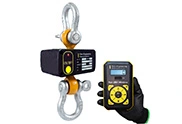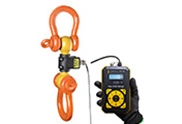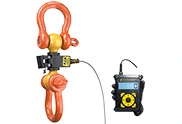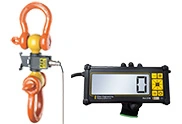85 Ton Load Cell
What are load cells?
Load cells are essential elements in the world of measurement technology. They allow businesses and organizations to determine the weight or force applied to an object. Load cells measure physical or mechanical stress by utilizing the electrical resistance principle. Their ability to provide accurate, real-time monitoring with high precision makes them indispensable in many industry applications: quality control, manufacturing, construction, transportation, and more
There are many types and styles of load cells—hydraulic, pneumatic, canister, and more. Each one has a specific purpose and is designed to be used for certain types of applications. Here, we’ll focus on tension load cells that use a strain gauge to measure lifted loads or tension.
Strain gauge load cells have a wide variety of uses and are therefore one of the most common and important types of load cells.
85-ton load cell
Along with there being several types of load cells, they’re also available in a range of maximum capacities—from a smaller 25-ton load cell, to large capacities like the versatile 85-ton load cell, or even a jumbo 250-ton load cell.
Choosing the right size load cell for the right job is critical, so it’s always important to know what you intend to be weighing or lifting with the equipment and to plan ahead with how you’ll use it.
When to use an 85-ton load cell
For large jobs involving heavy machinery or industrial equipment, an 85-ton load cell is an indispensable tool.
- An 85-ton load cell can be used in the construction industry to measure forces on site. It can be used to measure the weight or load-bearing strength of materials such as steel, concrete, and other heavy equipment.
- They can be used in the logistics and transportation industry to weigh large cargo, containers, and transport vehicles, helping increase safety and meet legal requirements.
- In aerospace, load cells can be used to measure the strain when testing aircraft components for structural resilience and tolerance. They can even be used to lift and measure entire rockets.
- An 85-ton load cell can also be used to calibrate and test the load capacity of cranes and hoists, ensuring safe operation.
- In wind turbine applications, load cells can help measure the forces being exerted on turbine blades and structures, assisting in their design and ensuring their safe operation.

Wireless load cells
While many load cells use a wire to transmit data, other advanced load cells can do so wirelessly.
Wireless load cells,AKA telemetry load cells, make use of advanced radio frequency technology to make using them both safer and more convenient.
Because there are no wires to get caught up in, wireless load cells are less of an on-site hazard. This, coupled with the fact that they allow the operator to be further from the lifted load, shows how they can easily increase safety.
Telemetry load cells are also easier to use since the operator has increased freedom of movement and isn’t tethered by a cable or wire.
When deciding on a new load cell, be sure to consider whether a standard wired system, or a wireless load cell is right for you.
Multi-point load cells
There are some applications where a single load cell just won’t cut it. For instances like these, you may need multi-point load cells.
There are systems where multiple load cells are used in conjunction to lift one or several individual loads. The load cells all communicate and send data to a central receiver where it can be monitored by the operator to ensure the lifted load isn’t overloaded or dangerous.
Multi-point load cells are found across sectors and application types: from military and aviation, to event rigging and load monitoring.
When choosing a multi-point system, there are different styles of load cells to choose from.
For instance, along with the standard load cell body, Eilon Engineering offers the wireless load shackle aka the shackle pin load cell. This design helps minimize headroom loss and allows for quick and efficient installation where multiple lifting points are used.


Eilon Engineering load cells: advantages
Eilon Engineering has been a leading manufacturer of load cells for more than 45 years and continues to bring innovation to the field of weighing during lifting.
Our systems combine quality and durability all while maintaining a lightweight, portable load cell body. For example, our 85-ton load cell weighs only 40 pounds (18 kg), meaning it’s easy to transport and easy to work with.
Eilon load cells offer a number of unique advantages, such as:
- 90-degree offset shackle holes for added stability and safety
- Market-leading 5-year warranty demonstrates our commitment to safety
- Fatigue Rated according to ASME BTH-1 and IEC 61508, meaning the load cell can withstand an unlimited number of load cycles
- Made of high-grade aerospace-quality steel
- Industry-leading battery life
- Much more
Free quote and expert advice
If you’re in the market for a new load cell, give us a call today. Our expert team of representatives will be happy to help you find the system that’s right for your unique application.
US/Canada/Int'l: 1-888-778-8064
UK: 0800 8620354
Send us an email at:
sales@eilon-engineering.com














.png) Barcelona Jan 30-Feb 2
Barcelona Jan 30-Feb 2